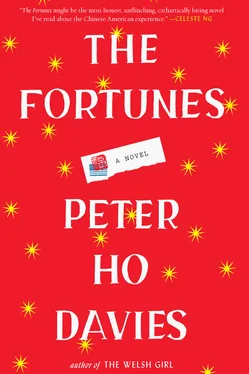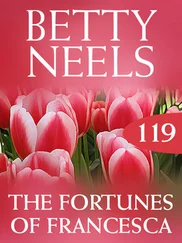And through it all he kept winning — not always, but often and steadily. Ling had stayed for a few days, scouting the tracks in and out of town for bodies, so he had a chance to observe him most evenings and overhear the gossip about him. Many were the theories as to how Ah Sam managed it. Cheating was ascribed to him — strategically placed mirrors on the walls, the collusion of waiters and the hurdy-gurdy dancers twirling across the floor — but he was always willing to change his seat, to sit with his back to the dance floor or bar. Some suggested that such was his Oriental inscrutability that he had a natural advantage in bluffing. Still others ascribed his success to sobriety, it being said that the bottle he swigged from at his elbow was filled with cold tea and not whiskey — a trick he may have learned from the hurdy girls, or learned them himself — which gave him another edge over most of his rivals. If appealed to directly, he would only say, “No trickee, no cheatee! Luckee!”
“He speaks perfectly good Melican,” Little Sister assured Ling, hawking into a spittoon. (She’d taken up chewing tobacco in the intervening years, as if to keep her aim in, though when he asked, she grimaced: “Takes away the taste of cum.”) “He just likes to Chink it up,” she noted. She wanted Ling to think well of him, he thought, and he was touched.
“At least he’s luckier than poor Ng,” he told her, and she rolled her eyes.
In truth, Ling had already guessed it wasn’t luck but the very opposite that served Sam so well. “Don’t believe in fortune,” the gambler opined contemptuously after the suckers had cleared out. The two of them were having a drink together, Little Sister hovering sleepily. Sam seemed to need to explain himself, but Ling found he already liked the man, was happy for Little Sister. “Didn’t I put in my years scratching around the mother lode?” Sam asked. He’d not struck it rich there, and he knew moreover from bitter experience what a Chinaman’s chance meant — none at all. He’d been run off claims, he’d seen his fellow Celestials gunned down for sport. (The story sounded so much like Ng’s that Ling wondered if he’d cribbed it from Little Sister, or if the similarity had drawn her to him.)
“You know we can’t testify against devils in law?” Ling nodded. “Best thing that ever happened,” Sam grunted.
“How d’you figure?”
“Chinese can’t testify, devil reckons he can do anything bad — whoring, dope, drink, gamble — around Chinese. He feels easy here! Good for business.”
“I guess so.”
“And, no, I don’t believe in luck,” Sam declared, banging his glass onto the table. And that was his edge when playing men — white men — who to a soul cherished, like a hand cupped around a flickering candle, a belief in it. Hadn’t they come out West on the basis of it? These men were quintessential Americans, believers in the main chance, certain they deserved better than their lot, that the world, the earth, owed them its treasures. (Ling thought those men believed in something else too — their superiority to a Chinaman — but he nodded along.) Such men, on aggregate, Sam was saying, stayed in a hand past their time, hoping, hoping, always hoping for the right card, or at least the wrong one for their opponent. “But I don’t believe in such stuff,” he asserted with a belligerent little puff of his chest. He bet on the cards he had, not the ones he wished for. That’s what the West had taught him. “My candle went out long ago, but I can see all the better in the dark for want of it.”
“He doesn’t believe in love either.” Little Sister smiled ruefully when the gambler had scraped his winnings into his hat and taken himself off to bed. “No more than I. It’s why we get along so tolerably well. A gambler who doesn’t believe in luck and a whore who doesn’t believe in love. It’s the secret of our success!” She looked at him shrewdly. “And what about you, bone scraper, do you believe in the afterlife?”
He shook his head slowly. “I’ve no ancestors, no descendants. I’ve no use for an afterlife.”
“Well, good for you!” She raised her glass. “All those credulous fools dreaming of going home even when they’re dead, paying good money for the privilege. Money that could get them fucked in this life if they spent it wisely. Oh, I know, they think women have no souls. What a lonely afterlife for them! I have no soul, so I make the most of my life here and now. Besides, who’s to say the soul resides in bones? Why not in the flesh? Any whore might tell you that.”
“But what do you believe in?” he asked her.
“Gold!” She grinned crookedly. “Still gold. I’m faithful! And you?”
“I believe,” he sighed, “you were pregnant. I didn’t want to at first.”
He stared at her steadily until she met his eyes.
“Were you?”
“But you never came looking for me!”
“I heard you were dead. Besides, I never knew your name.”
“Sure you did.”
“Your real name.”
“Mei Mei, Little Sister. That’s the name he gave me, even though I was the eldest.”
Ling stared at her.
“I guess he wanted to honor her.”
He nodded slowly.
“You didn’t answer my question, though.”
“Oh, who can remember? Who wants to? All the pregnancies and miscarriages, stillbirths, and worse.”
“I’m sorry.”
She shrugged. “Some live.” She gestured toward a girl sleeping on the bar. “My eldest. Goldie, they call her, though I named her Jin, on account her cradle was an old prospector’s rocker. Her sister is around here someplace too.” She smiled wanly. “How do you think I started my own business?”
He took a drink, shuddered only a little as he swallowed.
“They’re half?” he asked while she poured him another, and she nodded.
“But their children will be more white than not. They’ll be something. Storekeepers. Teachers!”
They were silent for a long time. He laid his hand on hers, and after a moment she turned it over, squeezed his back. She rose and pulled him up from the table.
“No charge,” she whispered.
“Now I’ve seen the elephant.”
She set her hands on her hips. “What are you suggesting?”
“I meant the money,” he said hastily, but she winked.
“I know what you mean. Just don’t go telling everyone. Bad for business, lah. Besides, Ah Sam wouldn’t like it.”
“He’s jealous.”
“Not so long as there’s gold involved.”
“I won’t tell a soul,” he promised, and she grinned.
“They’d never believe you anyway.”
He had been joking, but as he watched her disrobe, he wondered if he hadn’t really seen the elephant, seen it years ago, that first morning at Ng’s as she knelt in the tub to bathe.
When she was naked she stretched out a hand to caress his cheek and reach for his neck, not to pull him close for a kiss, as he thought, but to slowly draw his queue forth from his collar and smooth it over his shoulder.
Afterward, in bed, as he licked the taste of her tobacco off his lips, she told him her version of the elephant story.
The beast, in her variant, is approached not by blind men but by blind women. “One grabs his tail,” Little Sister said, making a gesture with her fist, “another his trunk. Ah, an elephant is like a penis, the first cries. And the second says, I’m keeping this elephant!” And they cupped their hands to each other’s mouth to catch their laughter as if it were spit.
Your Name in Chinese
The truth is always exciting. Speak it, then.
Life is dull without it.
— Pearl S. Buck
Читать дальше












